人教版英语八年级下册第三单元知识点归纳
新人教版八年级英语(下册)第三单元知识点总结归纳

新人教版八年级英语(下册)第三单元知识点总结归纳Unit 3: Could you please clean your room?One: "Peter。
could you please take out the rubbish?" - "Sure。
Mom."Could you please do something?" is used to make a request in a polite and indirect manner。
hoping for a positive response。
"Could" is not the past tense of "can," but a more polite way of speaking。
The answer should use "can."Common affirmative responses: "Sure," "Of course," "Certainly," "No problem." Negative responses: "Sorry。
I can't."Two: "Take out" means to remove something (v+adv)。
When using a pronoun as the object。
it goes in the middle。
Witha noun。
it can go in the middle or at the end.Phrases using "take":Take out" means to bring something out or remove it.Please take out a piece of paper."Please take it out."Take。
人教版八年级下册英语第三单元知识点
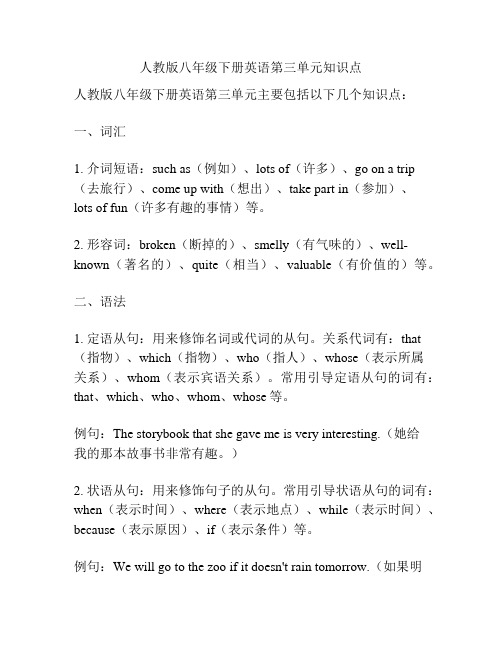
人教版八年级下册英语第三单元知识点人教版八年级下册英语第三单元主要包括以下几个知识点:一、词汇1. 介词短语:such as(例如)、lots of(许多)、go on a trip (去旅行)、come up with(想出)、take part in(参加)、lots of fun(许多有趣的事情)等。
2. 形容词:broken(断掉的)、smelly(有气味的)、well-known(著名的)、quite(相当)、valuable(有价值的)等。
二、语法1. 定语从句:用来修饰名词或代词的从句。
关系代词有:that (指物)、which(指物)、who(指人)、whose(表示所属关系)、whom(表示宾语关系)。
常用引导定语从句的词有:that、which、who、whom、whose等。
例句:The storybook that she gave me is very interesting.(她给我的那本故事书非常有趣。
)2. 状语从句:用来修饰句子的从句。
常用引导状语从句的词有:when(表示时间)、where(表示地点)、while(表示时间)、because(表示原因)、if(表示条件)等。
例句:We will go to the zoo if it doesn't rain tomorrow.(如果明天不下雨,我们会去动物园。
)3. 强调句型:强调句型是通过使用强调副词或者借助强调式动词来强调某一部分内容。
例句:It was Alice who won the first prize in the speech contest.(是爱丽丝在演讲比赛中获得了第一名。
)三、阅读技巧1. 根据上下文推测词义:通过上下文的提示来推测生词的词义。
2. 找出关键句:在一篇文章中,找出关键句可以帮助我们更好地理解文章的主旨。
3. 圈点标记:在阅读过程中进行圈点标记,可以帮助我们更好地理解文章,并且方便日后复习。
人教版英语八年级下册第三单元知识点总结

人教版英语八年级下册第三单元知识点总结could 表示委婉请求例句:Could you please sweep the floor? (句中有无please都可以。
)could 可用于有礼貌地向对方提出请求,用于疑问句中,可代替can,在时态上与can没有区别,但语气比can委婉、有礼貌。
其答语没有固定的形式,但要符合语境。
具体用法如下:例如:-Could you please pass the salt to me?你能把盐递给我吗?-Sure.当然。
-Could you walk the dog right now?你能现在遛狗吗?-Sorry, I can't. I have to do my homework first.抱歉,我不能。
我必须先做我的家庭作业。
情态动词could表请求和允许的用法例句:Could I go out for dinner with my friends?讲解:could 可用于征询对方许可,用于疑问句中,可代替can,在时态上与can没有区别,但语气比can委婉、有礼貌。
其答语没有固定的形式,但要符合语境。
具体用法如下:例如:-I left my pen at the office. Could I use yours?我把我的钢笔忘在办公室了。
我能用你的吗?-Yes, of course. Here you are.当然。
给你。
-Could I take a seat here?我能坐在这里吗?-I am afraid you can't. It is for my friend.我恐怕你不能。
这是给我的朋友的。
不定代词neither的用法不定代词neither,意为“两者都不”,可与介词of连用,其后的谓语动词通常用单数。
如:1. Neither of the two boys is clever.两个男孩都不聪明。
2. -Which one do you like?-Neither. I think they're both ugly.—你喜欢哪一个?—两个都不喜欢,我觉得两个都很难看。
英语八年级下(人教版)第三单元重点知识总结
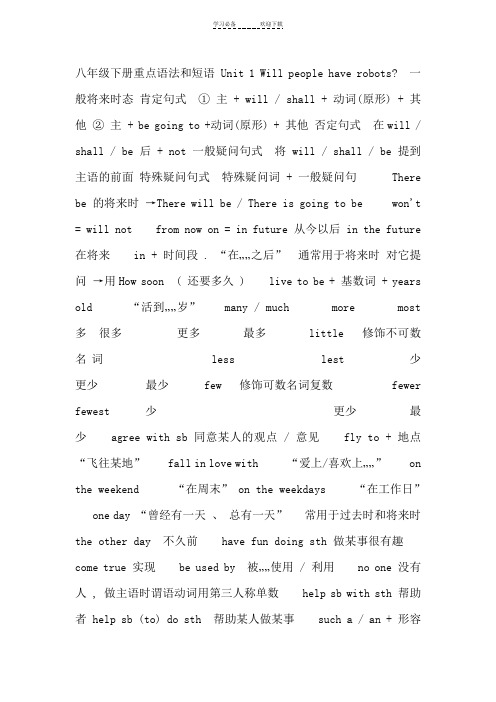
八年级下册重点语法和短语 Unit 1 Will people have robots? 一般将来时态肯定句式主 + will / shall + 动词(原形) + 其他②主 + be going to +动词(原形) + 其他否定句式will /shall / be 后 + not 一般疑问句式will / shall / be 提到主语的前面特殊疑问句式 + 一般疑问句 Therebe 的将来时→There will be / There is going to be won't= will not from now on = in future 从今以后 in the future在将来 in + 时间段 . “在……之后”通常用于将来时对它提问→用How soon ( 还要多久 ) live to be + 基数词 + yearsold “活到……岁” many / much more most 多更多最多 littleless lest 少更少最少 few fewer fewest 少更少最少 agree with sb 同意某人的观点 / 意见 fly to + 地点“飞往某地” fall in love with “爱上/喜欢上……” onthe weekend “在周末” on the weekdays “在工作日”one day “曾经有一天、总有一天”the other day 不久前 have fun doing sth 做某事很有趣come true 实现 be used by 被……使用 / 利用 no one 没有人 , 做主语时谓语动词用第三人称单数 help sb with sth 帮助者 help sb (to) do sth 帮助某人做某事 such a / an + 形容词 + 可数名词单数“如此 / 这样的一个……” try to dosth 尽力做某事 try doing sth 尝试做某事 be able to dosth. = can do sth能够做某事 hundreds of 数以百计的 ,大量的 thousands of 数以千计的 look for 寻找the same as 和……一样 be different from 和……不同 It is + 形容词 + for sb to do sth Wake up 醒来 Make sb do sth 让某人做某事Unit 2 What should I do? 重点语法should ,would都可以用来提出建议 Should / would +动词原形“应该 / 可以做……”重点短语 1、 be in style 流行的 be out of style 过时了 2、 write sb a letter =write a letter to sb 给某人写一封信 3、 call sb up 给某人打电话 = make a call to sb 4、be surprised at……对……感到吃惊、 to one’s surprise, 使某人吃惊的是…… 5、argue with sb 与某人争论 / 辩论 argue about sth 为某事争论 6、pay for sth 支付 sb pay + 钱for sth 某人花了多少钱买…… 7、have no idea 不知道 8、borrow sth from sb 向某人借东西 lend sth to sb 把某物借给某人 9、ask sb for sth 向某人要…… ask sb todo sth. 请求某人做某事 ask sb not to do s th. 请求某人不要做某事 10、buy sb sth = buy sth for sb 给某人买某物 11、 the same + 名词 + as 和……一样…… thesame as 和……一样 be different from 与……不同12、be popular with 受……的欢迎 13、find out 找出look for 寻找 14、invite sb to do sth 邀请某人做某事 15、be angry with sb 对某人生气 be angry at sth 对某事生气 16、get on well with sb / sth 与……相处得好7、have a fight with sb 和某人打架 18、give sb some advice 给某人一些建议 19、not …… untill 直到……才 20、 fit ……into 安排时间做…… 21、complain about doing sth 抱怨做…… 22、compare A with B 把A和B相比 compare A to B 把A比作 B 23、all kinds of 各种各样的 24、on the one hand , on the other hand , ……。
人教部编版八年级英语下册3单元笔记重点汇总
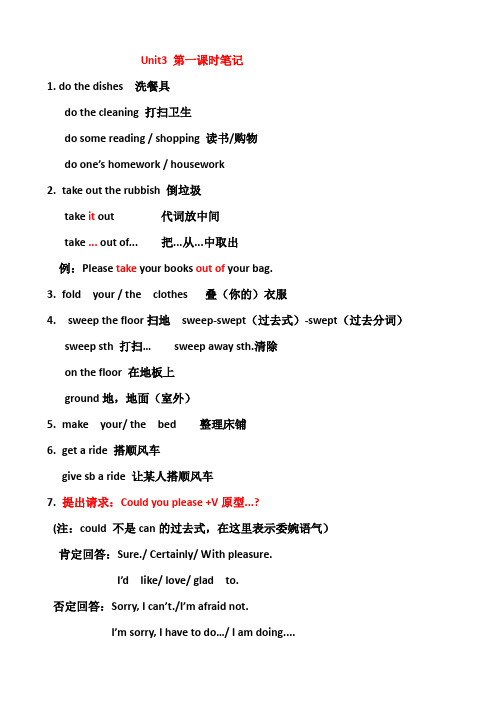
Unit3 第一课时笔记1. do the dishes 洗餐具do the cleaning 打扫卫生do some reading / shopping 读书/购物do one’s homework / housework2.take out the rubbish 倒垃圾take it out 代词放中间take ... out of... 把...从...中取出例:Please take your books out of your bag.3.fold your / the clothes 叠(你的)衣服4.sweep the floor扫地sweep-swept(过去式)-swept(过去分词)sweep sth 打扫…sweep away sth.清除on the floor 在地板上ground地,地面(室外)5.make your/ the bed 整理床铺6.get a ride 搭顺风车give sb a ride 让某人搭顺风车7.提出请求:Could you please +V原型...?(注:could 不是can的过去式,在这里表示委婉语气)肯定回答:Sure./ Certainly/ With pleasure.I’d like/ love/ glad to.否定回答:Sorry, I can’t./I’m afraid not.I’m sorry, I have to do…/ I am doing....I’d love to, but I....这个句型的否定形式:Could you please not +V原型...? 请不要...可以吗?8.征求同意:Could I …?例:Could I go out with friends, mom?肯定回答:Yes, you can./ Sure./Of course.否定回答:No, you can’t. You need to…注意:不用could回答9.work on 从事于,致力于10. help out (with something)是一个动词短语,表示在某人繁忙或是遇到困难时“给予帮助”。
人教版八年级英语下册Unit3短语归纳+重点考点总结
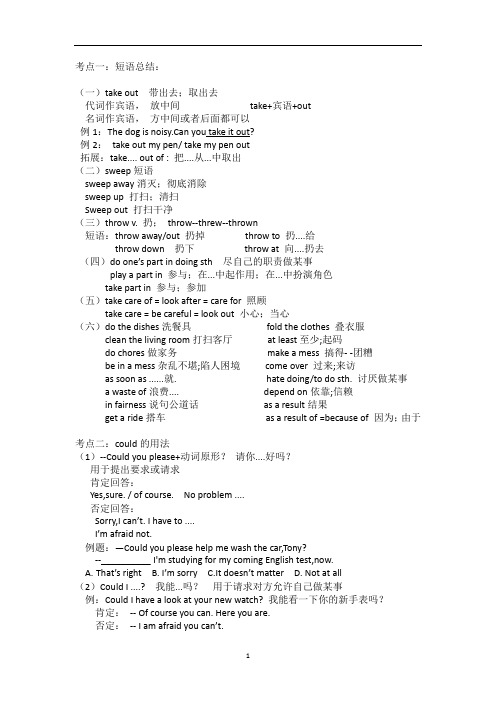
考点一:短语总结:(一)take out 带出去;取出去代词作宾语,放中间take+宾语+out名词作宾语,方中间或者后面都可以例1:The dog is noisy.Can you take it out?例2:take out my pen/ take my pen out拓展:take.... out of : 把....从...中取出(二)sweep短语sweep away消灭;彻底消除sweep up 打扫;清扫Sweep out 打扫干净(三)throw v. 扔;throw--threw--thrown短语:throw away/out 扔掉throw to 扔....给throw down 扔下throw at 向....扔去(四)do one’s part in doing sth 尽自己的职责做某事play a part in 参与;在...中起作用;在...中扮演角色take part in 参与;参加(五)take care of = look after = care for 照顾take care = be careful = look out 小心;当心(六)do the dishes洗餐具fold the clothes 叠衣服clean the living room打扫客厅at least至少;起码do chores做家务make a mess 搞得--团糟be in a mess杂乱不堪;陷人困境come over 过来;来访as soon as ......就. hate doing/to do sth. 讨厌做某事a waste of浪费.... depend on依靠;信赖in fairness说句公道话as a result结果get a ride搭车as a result of =because of 因为;由于考点二:could的用法(1)--Could you please+动词原形?请你....好吗?用于提出要求或请求肯定回答:Yes,sure. / of course. No problem ....否定回答:Sorry,I can’t. I have to ....I’m afraid not.例题:—Could you please help me wash the car,Tony?--__________ I'm studying for my coming English test,now.A.That’s rightB. I’m sorryC.It doesn’t matterD. Not at all(2)Could I ....? 我能...吗?用于请求对方允许自己做某事例:Could I have a look at your new watch? 我能看一下你的新手表吗?肯定:-- Of course you can. Here you are.否定:-- I am afraid you can’t.(3)表示能力Could表示过去的能力,can表示现在的能力can--couldCould you speak English then?那时候你会说英文吗?例题:1.-- ______you give me a hand? I can’t move the box by myself.-- No problem.A.CouldB. ShouldC.MustD. Need2.Li Ming_______speak two languages when he was eight years old.A.mayB. canC. can'tD. could考点三:1.复数名词(短语)作主语用法表示时间、重量、距离、价格等的复数名词(短语)作主语,谓语动词一般用单数形式ten minutes/ four thousand dollars ..做主语例题:For kids of this age, two hours of sitting in a classroom______too long.A.isB.areC. wasD.were考点四:For one week,she didn’t do any housework and neither didi I.(1)neither/nor +be动词/助动词/情态动词+主语结构“也不....’’ 注意:Me neither. 不能说Me nor.(2)作代词,"两者都不"neither of 结构作主语时,谓语动词用单数Neither of them has a car. 他们两个都没有汽车。
人教版八年级下册英语第三单元知识点

人教版八年级下册英语第三单元知识点Unit 3 Could you please clean your room?一、重点短语1.go out for dinner出去吃饭2.stay out late在外面待到很晚3.go to the movies去看电影4.geta ride搭车5.work on从事6.cleanand tidy干净洁7.do the dishes洗餐具8.takeout the rubbish倒垃圾9.fold your/the clothes叠衣服10.sweepthe floor扫地11.make your/the bed整理床铺12.cleanthe living room打扫客厅13.no problem没问题14.welcomesb.欢迎某人e home fro m school/work放学/下班回家16.throw down扔下17.sit down坐下eover过来19.take sb.for a walk带某人去散步20.all the time总是21.all day/evening整日/夜22.dohousework做家务23.shout back大声回应24.walkaway走开25.a comfortable home一个舒适的家26.share the housework分担家务27.get some thing to drink拿点喝的东西28.insurprise惊讶地29.watch one show观看节目30.hangout闲逛31.pass sb.sth.把某物传给某人32.lend sb.sth.把某物借给某人33.get sth.wet使某物弄湿34.hate to do sth.讨厌做某事35.help sb.to do/with sth帮助某人干某事36.do chores做杂务37.bring a tent带顶帐篷来38.buy some snacks买些小吃39.invite sb to a party邀请某人参加聚会40.go to the store去商店41.make sb.do sth使某人做某事42.enough stress足够的压力43.a waste of time浪费时间44.inorder to为了45.get goodgrades取得好成绩46.minddoing sth.介意做某事47.developchildren’s independence发展孩子的独立性48.dependon依赖49.do ones part in(doing)sth.做某人分内的事50.look after/take care of 照顾;51.finish doing sth.完成做某事二、知识点解析1.“Could you please do sth.?”的答语以下两种情况:接受请求时可以用Yes,sure./Sure./Of course./Certainly./No problem./My pleasure./It’s my pleasure./With pleasure.等来回答拒绝请求时可以用Sorry./Sorry,I can’t.等来回答,还可以用Ihave to do sth.来解释其否定句是:“Could youplease not do sth.?”2.有关“家务劳动”有关的短语:takeout the rubbish/trash倒垃圾foldone’s clothes叠衣服sweepthe floor扫地cleanthe room打扫房间makeone’s/the bed铺床dothe dishes/wash the dishes洗餐具3.throw down扔下throwat扔向,掷向throw away扔掉例题:Recycling is good,so don’t__________bottles or newspapers.A.find outB.hand ine upD.throw away4.the minute表示“一…….就……”,相当于as soon as.(引导时间状语从句)e.g.:I’ll tell himthe minute he gets there.5.常见time的短语:all the time一直,总是at times不时,有时in time及时on time按时forthe first time第一次in no time立刻at any time随时bythe time到...的时候atthe same同时have a good/great/wonderful time玩的愉快例题:---Hurry up.It’s almost time for school.---Don’t worry.We are sure to be atschool__________.A.at timesB.on timeC.all the timeD.by the time6.as….as表示“和……一样”,之间要用形容词或副词的原级。
人教版八年级下册英语Unit3重点知识汇总
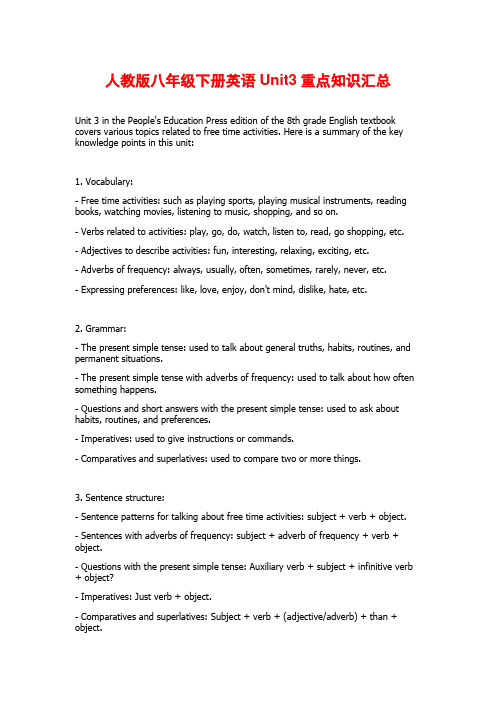
人教版八年级下册英语Unit3重点知识汇总Unit 3 in the People's Education Press edition of the 8th grade English textbook covers various topics related to free time activities. Here is a summary of the key knowledge points in this unit:1. Vocabulary:- Free time activities: such as playing sports, playing musical instruments, reading books, watching movies, listening to music, shopping, and so on.- Verbs related to activities: play, go, do, watch, listen to, read, go shopping, etc. - Adjectives to describe activities: fun, interesting, relaxing, exciting, etc.- Adverbs of frequency: always, usually, often, sometimes, rarely, never, etc.- Expressing preferences: like, love, enjoy, don't mind, dislike, hate, etc.2. Grammar:- The present simple tense: used to talk about general truths, habits, routines, and permanent situations.- The present simple tense with adverbs of frequency: used to talk about how often something happens.- Questions and short answers with the present simple tense: used to ask about habits, routines, and preferences.- Imperatives: used to give instructions or commands.- Comparatives and superlatives: used to compare two or more things.3. Sentence structure:- Sentence patterns for talking about free time activities: subject + verb + object. - Sentences with adverbs of frequency: subject + adverb of frequency + verb + object.- Questions with the present simple tense: Auxiliary verb + subject + infinitive verb + object?- Imperatives: Just verb + object.- Comparatives and superlatives: Subject + verb + (adjective/adverb) + than + object.4. Listening and speaking skills:- Listening for specific information: listening for details about someone's free time activities.- Speaking about preferences: expressing likes and dislikes about free time activities.5. Reading skills:- Reading for main ideas: skimming a text to understand the overall topic.- Reading for details: scanning a text to find specific information.It's important to review and practice these key knowledge points through various activities, such as completing exercises, having conversations, and reading and listening to texts in order to reinforce understanding and improve language skills.。
- 1、下载文档前请自行甄别文档内容的完整性,平台不提供额外的编辑、内容补充、找答案等附加服务。
- 2、"仅部分预览"的文档,不可在线预览部分如存在完整性等问题,可反馈申请退款(可完整预览的文档不适用该条件!)。
- 3、如文档侵犯您的权益,请联系客服反馈,我们会尽快为您处理(人工客服工作时间:9:00-18:30)。
Unit3 Could you please clean your room?1、Peter ,could you please take out the trash? 彼得,你能把垃圾倒了吗?Could you please do sth ?请你(做)......好吗? 用于提出请求,希望得到对方的肯定回答,说话的语气比较客气委婉。
Could 不是can的过去式,是委婉、礼貌的说法。
回答用can.【常用答语】肯定回答:Sure./ Of course./ Certainly./No problem. 否定回答: Sorry , I can’t2、take out 取出(v+ adv)【注】: 跟代词做宾语,代词放中间;跟名词做宾语,可放在中间,也可放在后边His teeth hurt badly. The dentist take them out .【短语】take out the trash 倒垃圾take a walk 散步take away 拿走,取走take back 收回take place 发生take off 脱下; 起飞3.Can you do the dishes.?那你可以洗盘子吗?do the dishes 洗碗【结构1】do the +名词: do the dishes/ laundry 洗餐具/衣服【结构2】do the +动词-ing do the cleaning 打扫卫生【结构3】do one’s + 名词do one’s housework/ homework 做家务/家庭作业【结构4】do some +动词-ing do some reading/ shopping 读写书/购物4.Could I at least finish watching this show? 至少让我看完这个节目可以吗?1】Could I do a sth? 我可以做......吗?用于表达请求,语气比较委婉。
Could I go out with my classmate this weekend? at least 至少,多指数量或程度上的最低限度。
(反) at most 至少,不超过Now all of us exercise at least an hour a day and outside school. finish v 结束;完成finish doing sth 做完某事-Can you finish reading these books before 10 o'clock? - Yes, I can5、I think two hours of TV is enough for you! 我觉得你看两个小时的电视已经足够了。
1】two hours of TV 表示时间、距离、金额、度量等词语作主语时,通常被视作整体,谓语动词用单数形式。
How time is flies! Three years is (be) really a short time.足够的,充分的(在句中作定语或表语)【解析2】enough I don’t have enough money with me.足够;充分(放在形容词;副词后)The river is deep enough for swimming.【记】Mr. Smith has enough money ,but he isn’t kind enough to help others.【注意】enough 修饰名词时,置于名词前;修饰形容词时,置于形容词之后。
6、Could you take out the rubbish,fold the clothes and do the dishes?你能把垃圾倒了。
把衣服叠好,再把碗洗了吗?【解析】take out 拿出;取出take 的用法:Please take some books to the classroom.Take this medicine three times a day.take They usually take the bus to work.It takes me two hours to do my homework every day.【拓展】take 构成的短语:take a walk 去散步take a rest 休息take care of 照顾take off 脱下;起飞take up 占据take down 拿下take one’s time 不急;慢慢来take one’s temperature 量体温7.The minute I sat down in front of the TV, my mom came over .我刚坐在电视机前面,我妈妈就过来了。
【解析1】the minute = as soon as “一...... 就......”Please write to me the minute you get there.【解析2】in front of 指在物体外部的前面There is a bike in front of the classroom.【辨析】指在物体内部的前面Our teacher is standing in the front of the classroom 【记】The driver sat _in the front of the car. The policeman stood in front of the car.【注意】有the无the区别大:at table 吃饭;进餐in hospital 住院at the tabel 在桌边in the hospital 在医院(不一定看病)【解析3】come over 过来【拓展】come 短语:come across(偶然)发现come back 回来come up with想出come true实现come down下来come from=be from来自,出生于come in/into进入,进来come on赶快,加油come along走吧,过来,快点come and go来来去去come up上来come out出来,(花)开,(照片)冲洗出来8.You watch TV all the time and never help out around the house! 你总是看电视,从不帮忙做家务!all the time = always 一直;总是9.I’m just as tired as you are! 我和你一样累! 【解析】as...as ... 和......一样......10.For one week , she did not do any housework and neither did I. 一周的时间,她不做任何家务,我也不做。
【解析】neither +助动词/系动词/情态动词+主语“某人(主语) 也不”⑴neither两者都不neither …nor…既不…也不…,连接两个词做主语,谓语动词由后一个主语确定Neither Tom nor Jim is a student ⑵表达“…也不……”则用“Neither /Nor + be / V助/ V情+ 主”-The first one wasn’t bad. - Neither was the second.11.The next day , my mom came home from work to find the house clean and tidy.第二天,妈妈下班回到家后发现房间很干净、整洁。
【解析】find +宾语+宾语补足语【注】find →found →found v寻找(1) find sb. doing sth 发现某人做某事(2) find it + adj. + to do sth 发现做某事很……◆find it difficult/ hard to do sth 发现做某事很困难She found it hard to finish the work by herself.11. She asked in surprise.她吃惊地问道。
【解析】in surprise 惊奇地;吃惊地surprise v 使吃惊→surprising adj. 令人吃惊的→surprised adj. 吃惊的to one’s surprise 使某人吃惊的是in surprise 吃惊地be surprised at 对……感到吃惊To my surprise_(使我吃惊的是),he got the first prize in the exam.12.“I’m do sorry, Mom. I finish understand that we need to share the housework to have a clean and comfortable home.”I replied.“对不起,妈妈。
我终于理解为了拥有一个干净、舒适的家我们需要共同来分担家务。
”我回答说。
【解析1】need v 需要用于肯定句,是实义动词。
(1)人做主语,sb. need to do sth 某人需要做某事(2)物做主语,sth need doing sth= sth need to be done ①Students need to have (have) a good rest in studying. ②The watch needs mending (mend).用于否定句或疑问句,是情态动词(1)needn’t = don’t have to 没有必要(2)need ,must 引导的一般疑问句,肯定会的用must,否定回答用needn’t -Must I go there now? - Yes,you must/No, you needn’t 【解析2】share 分享;共用share sth 分享或共用某物share sth with sb. 与某人分享某物All his friends Shared his happiness when he won the match.13.Could I hang out with my friends after the movie? 看完电影后我能和朋友们一起闲逛吗? 【解析】hang out 闲逛hang up 把......悬挂/挂起14.Could you please pass me the salt?你能把盐递给我吗? 【解析】pass ⑴v 给;递;走过;通过pass sb.sth 把某物递给某Pass on 传递Please pass the paper on to the other students.⑵v 通过;路过I pass your home.⑶v 通过(考试);及格Tom can pass his math exam.15.Could I borrow that book?我能借下你那本书看吗、Could you lend me some money?你能借我一些钱吗?【解析】borrow /lend/keep (1)borrow 借入,与from 连用,尤指主语“【借进来”】borrow sth from sb. 从某人那里借某物You can borrow the book from thelibrary.(2)lend 借出,与to 搭配【指借出去】lend sb sth=lend sth to sb 把某物借给某人He doesn’t want to lend his book to others.(3)keep 保留,保存(延续动词,可以与表示一段时间的状语连用)【指借一段时间】【记】I want to __borrow__ a bike from my friend but he didn’t _lend___ it to me,because Tom had _kept____ it for two days.16.I cut my finger and I’m trying not to get it wet.我的手指割伤了,伤口不能弄湿。
